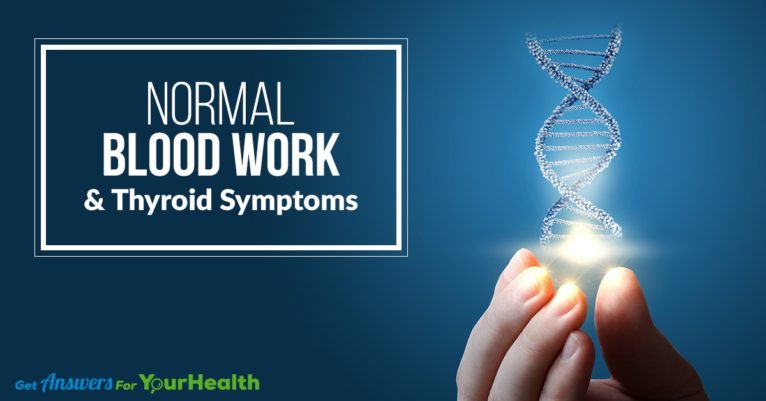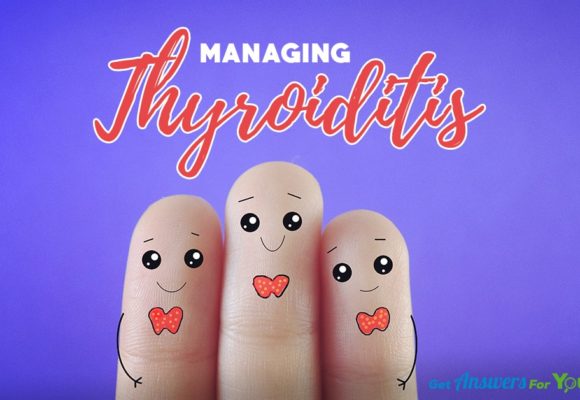1) Grab a FREE copy (Value $14.95) of one of my books Thyroid Symptom Overload
Just pay shipping $7.95 for any US orders. Or, if you want to pay full price plus shipping, order from Amazon :)
2) Take our Thyroid Quiz today and find out what "Thyroid Type" you have
This quiz will help you quickly discover where your symptoms are stemming from.
3) Join Our Thyroid Advocate Membership Site - Natural Thyroid Academy
FREE for a limited time. No credit card required.
4) Work with me and my team privately
Schedule your FREE 15 minute phone consultation and we can find out the best way to help you specifically.
The foundation of any medical condition is its diagnosis. However, thyroid dysfunction seems to have a weak foundation i.e. unreliable diagnostic techniques. In 1999, Dr Denis StJ O’Reilly, the consultant clinical biochemist, published a detailed research study on the diagnostic patterns of thyroid dysfunction. It emphasized the need of a proper biochemical or any other kind of diagnosis for thyroid health, because the biochemical testing and clinical consultative evaluation are inadequate, and are not backed by reliable data.
Worse, the range of healthy thyroid is determined with Thyroid Stimulating Hormone’s range measured through blood tests. Unfortunately, the healthy range of TSH is still unknown, and many clinical researchers suggest that TSH range may differ from person to person.
The research also discusses the Whickham Survey, a 20-year follow-up study based on the random samples of 2,779 adults. Along with providing eye-opening data under thyroid physiology, the survey also concluded that TSH serum levels above 2mU/L increase the probability of hypothyroidism.
Dr Denis’ study also concluded that clinical diagnosis of thyroid usually depends on the biochemical diagnosis, instead of symptom assessment. Having that said, the vulnerability to thyroid dysfunction is higher with the effects of complex non-thyroidal illnesses.
With many contradictions in thyroid diagnosis patterns, the patient may suffer from symptoms for more than a decade in some cases. Common thyroid symptoms in the body that may prevail even after medication and therapies include the following.
- Feeling lethargic or fatigued for most of the time
- Slow and steady weight gain (even despite working out or being active)
- Foggy mind
- Decline in memory
- Loss of concentration
- Hair thinning and hair loss
- Thinning of the outer third part of eyebrows
- Cold intolerance
- Loss of energy
- Difficulty getting out of the bed
- Constipation
- Hurting joints or cramping legs, or both
- Dry, coarse skin
- Brittle nails
- The need of increased sleep
- Increased cholesterol
The prevalence of thyroid symptoms in the body suggests that either the blood tests are failing to diagnose your underlying thyroid condition, or you have some other medical condition with symptoms similar to thyroid dysfunction. We will discuss these two possibilities separately in this blog. Please consult your medical doctor for proper diagnosis.
Possibility 01 – Your Blood Tests have Failed to Diagnose Underlying Thyroid Problem
Outdated TSH Diagnostic Techniques
Thyroid Stimulating Hormone, released by the pituitary gland, stimulates your thyroid glands to produce thyroid hormones, T3 and T4. When the thyroid gland does not produce adequate hormones, the pituitary gland releases more TSH to force the thyroid gland to produce more hormones.
The range that medical doctors use to diagnose thyroid problems is TSH Reference Range (0.5–4.70mU/L). The majority of medical doctors consider TSH Reference Range as the range of a healthy TSH.
When we talk about a reference range, we refer to the “possibilities”, which may differ from person to person. The symptoms of thyroid dysfunction may prevail because TSH measured in the blood test and declared to be normal was actually abnormal for their given physiology.
Unreliable Measurement of Total and Free T3 and T4
Many conventional doctors rely on TSH test and do not suggest free and total T3 and T4 thyroid testing. If the TSH levels are low and free T4, T3 and total T4, T3 levels are above the reference range, the patient may be diagnosed with hyperthyroidism by their medical doctor. If the TSH levels are high and free and total T3 and T4 levels are low, the patient may be diagnosed with hypothyroidism by their medical doctor.
Thyroid Hormone Resistance is a rare thyroid malfunction which thyroid hormone levels increase in the blood, but the levels of Thyroid Stimulating Hormone are not decreased. Thyroid gland rejects excess TSH, which causes thyroid malfunction. Ana Marcella Rivas’ research published in 2016 explains that Thyroid Hormone Resistance is an abnormal, inherited condition, leading to decreased thyroid gland sensitivity. Unfamiliarity of the underlying Thyroid Hormone Resistance disorder may lead to unnecessary medication or treatments, such as radioactive iodine ablation. Please talk to your medical doctor about this.
Failure to Conduct Full Thyroid Testing Panel
The thyroid is delicate, complex, and associated with almost all organs in our body. Full thyroid testing blood work comprises of the following; TSH, Free T3, Free T4, Reverse T3, Total T3, Total T4, Thyroglobulin antibodies, and Thyroid Peroxidase Antibodies.
The full panel of thyroid testing may also require some other tests depending on the symptoms of the body and medical history of the patient’s family. The important medical history to look into includes liver disease, gall bladder disease, kidney disease, diabetes, cancer, Alzheimer’s, and other autoimmune diseases.
Thyrotoxicosis
Research suggests that around 2% of women and 0.2% of the men suffer from some level of thyrotoxicosis. Smokers tend to have higher chances of autoimmune thyrotoxicosis. It is also known as hyperthyroidism, a condition in which thyroid gland produces excess hormones. Hyperthyroidism is diagnosed by your medical doctor ordering tests that measure the levels of thyroid hormones in the blood.
The American Thyroid Association has published complete guidelines for diagnosis and management of thyrotoxicosis and its different causes.
Ferritin and Hypothyroidism
Imbalanced Ferritin, the iron-storing proteins in our body, could trigger or affect hypothyroidism in human body. Low Ferritin levels cause anemia and high levels may stimulate chronic diseases, such as hemochromatosis. The study suggests that the patients of hypothyroidism tend to have low Ferritin serum levels in their blood, compared to a normal person.
Possibility 02 – You Have Some Other Medical Condition with Symptoms Similar to Thyroid Dysfunction
Increased Toxic Load in The Body
The liver is responsible for converting T4 into active and functional T3. When toxic load of heavy metals increases in the body, it adversely affects the liver, which is designed to cleanse the toxins from the body. When this toxic load increases beyond the capacity of liver, it causes disturbances in hormone regulation and affects the thyroid gland. The symptoms of increased toxic load in the body are quite similar to that of thyroid dysfunction, such as depression, weight gain, skin problems, acid reflux, constipation, and headaches.
In such a condition, the underlying thyroid condition of the patient can be addressed by cleansing the toxic load from the body. Other helpful things to help include eating clean food (preferably organic), staying hydrated, drinking alkalizing juices and smoothies, avoiding plastic products, and eating non-allergenic foods.
It also includes avoiding all sources of toxins, such as industrially processed products, combustion-treated products, Persistent Organic Pollutants, and cigarette smoke.
At times, Thyroid dysfunction may be triggered by an underlying problem. The following commonly affect the function of thyroid.
- Graves’ Disease
- Thyroid nodules
- Acute infectious thyroiditis
- Toxic multi-nodular goiter
- Goiter
- Hashimoto’s hypothyroidism
- Cretinism
- Thyroid hormone resistance
- Silent thyroiditis
- Postpartum thyroiditis
Your Suitable Options
The following are the necessary thyroid tests and their reference ranges. Please discuss with your medical doctor.
| Thyroid Test | Reference Range |
| Free T4 (Free Thyroxine) | 0.8-1.8 ng/dL |
| Total T4 (Thyroxine) | 4.5-12.5 µg/dL |
| Free T3 (Free Triiodothyronine) | 2.3- 4.2 pg/mL |
| Total T3 (Triiodothyronine) | 80 -200 ng/dL |
| TSH (Thyroid Stimulating Hormone) | 0.5-4.70 µIU/mL |
| RT3 (Reverse T3/Reverse Triiodothyronine) | 10-24 ng/dL |
| TgAb (Thyroglobulin Antibodies) | 0-4.0 IU/mL |
| Tg (Thyroglobulin) | Thyroid gland absent 0-0.1 ng/ml. Thyroid gland present 0-33 ng/mL |
| TPOAb (Thyroid Peroxidase Antibodies) | 0-35 IU/mL |
| TSI (Thyroid-stimulating Immunoglobulins) | 0-1.3 |
Alongside understanding your healthy hormonal ranges, it is also important to consider other options, including the following;
- If you are already undergoing thyroid treatment, and your symptoms have not improved, ask your medical doctor if you can target new TSH levels with slight changes in medication.
- Changing the brand of thyroid medication might also help improve the symptoms of thyroid condition. If you are allergic to the ingredients of T4 thyroid medicine, take your medicines wrongly, or take any medicines that may cancel out the effect of your T4 medicines, chances are that T4 is either not absorbed or not converted to active T3 in your body. In such a case, additional T3 medicine could help. Please consult with your medical doctor and thyroid pharmacist to discuss this further.
- Alternative and holistic approaches do not treat the thyroid problem directly, but they assist in supporting the symptoms of the patient. Therefore, these should also be considered. Should you have any questions or require further information or guidance, feel free to contact us, we are here to help you.








